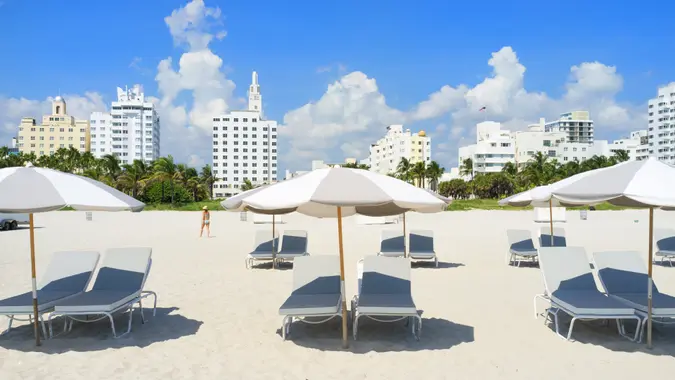3 US Cities Most at Risk of Experiencing the Next Housing Bubble

Commitment to Our Readers
GOBankingRates' editorial team is committed to bringing you unbiased reviews and information. We use data-driven methodologies to evaluate financial products and services - our reviews and ratings are not influenced by advertisers. You can read more about our editorial guidelines and our products and services review methodology.

20 Years
Helping You Live Richer

Reviewed
by Experts

Trusted by
Millions of Readers
Savvy real estate investors want to buy property in places where home prices are steadily increasing, but in some markets, prices are rising at an unsustainable rate and are at risk of “bursting.” Fortunately, as the global housing market stabilizes, bubble risk has been declining, according to the latest UBS Global Real Estate Bubble Index.
On a global level, the bubble risk has decreased thanks to post-pandemic price corrections and a housing shortage, which has driven rent prices up. However, there are still some cities around the world that are considered to be at risk for a housing bubble, including three U.S. cities.
Miami
Miami has the highest bubble risk score of any city in the world and is considered to be at “high” bubble risk.
While housing price growth on a global scale has largely been muted over the last year, prices are still surging in Miami. According to the UBS data, home prices in Miami have risen by almost 50% since the end of 2019, with a 7% rise in the last year.
Los Angeles
Los Angeles is considered to have an “elevated” bubble risk and is ranked No. 4 globally for the highest bubble risk. Los Angeles’ bubble risk is not due to rising house prices, but to comparatively low rent prices.
“In Los Angeles, real housing prices have barely increased since mid-2023,” the report states. “As a result of decreasing economic competitiveness and high living costs, the population in Los Angeles County has been declining since 2016. Consequently, rents have not kept pace with consumer prices.”
Boston
Boston has a “moderate” bubble risk; it’s ranked No. 9 globally.
“Boston’s housing market has recorded a 20% price growth since 2019, outpacing both the local rental market and income growth,” the report states. “However, the local economy has been struggling recently, which could see a change in this trend.”
More From GOBankingRates
Sources
 Written by
Written by  Edited by
Edited by 

























